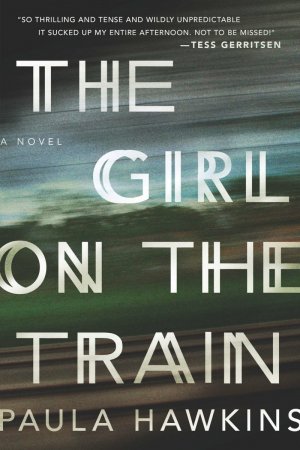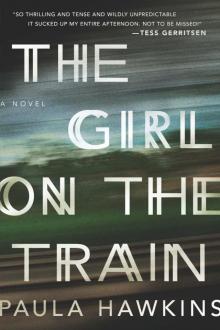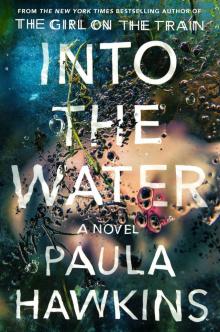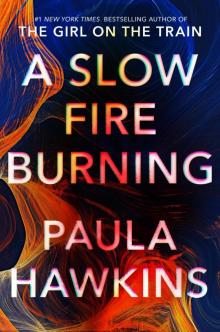- Home
- Paula Hawkins
Into the Water Page 25
Into the Water Read online
Page 25
Sean’s face crumpled. “There was a storm when I woke up, it was very loud, and there were funny noises in the kitchen.”
“What sort of funny noises?”
“Like . . . like a dog makes, when it’s sad.”
“Like a whimper?”
Sean nodded. “But we don’t have a dog because I’m not allowed. Dad says I won’t look after it properly and it’ll be just another thing for him to do.” He sipped his tea and wiped his eyes. “I didn’t want to be by myself because of the storm. So Dad put me in the car.”
“And your mum?”
He frowned. “Well. She was in the river and I had to wait under the trees. I’m not supposed to talk about it.”
“What do you mean, Sean? What do you mean, not supposed to talk about it?”
He shook his head and shrugged, and didn’t say another word.
SEAN
Howick. Near Craster. Not so much history repeating itself as playing games with me. It’s not far from Beckford, not much more than an hour’s drive, but I never go. I don’t go to the beach or the castle, I’ve never been to eat the famous kippers from the famous smokehouse. That was my mother’s thing, my mother’s wish. My father never took me, and now I never go.
When Tracey told me where the house was, where I would have to go, I felt moved. I felt guilty. I felt the way I had when I thought about my mother’s promise of a birthday treat, the one I’d rejected in favour of the Tower of London. If I hadn’t been so ungrateful, if I’d said I wanted to go with her to the beach, to the castle, would she have stayed? Would things have turned out differently?
That never-to-be-taken trip was one of many subjects that occupied me after my mother died, when my whole being was consumed with constructing a new world, an alternate reality in which she did not have to die. If we had taken the trip to Craster, if I had cleaned my room when I was told, if I hadn’t muddied my new school satchel when I went swimming downriver, if I’d listened to my father and hadn’t disobeyed him so often. Or, later, I wondered whether perhaps I shouldn’t have listened to my father, perhaps I should have disobeyed him, perhaps I should have stayed up late that night instead of going to bed. Perhaps then I might have been able to persuade her not to go.
None of my alternative scenarios did the trick, and eventually, some years later, I came to understand that there was nothing I could have done. What my mother wanted was not for me to do something, it was for someone else to do something—or not do something: what she wanted was for the man she loved, the man she met in secret, the man with whom she’d been betraying my father, not to leave her. This man was unseen, unnamed. He was a phantom, our phantom—mine and my father’s. He gave us the why, he gave us some measure of relief: it wasn’t our fault. (It was his, or it was hers, theirs together, my traitorous mother and her lover. We couldn’t have done any better, she just didn’t love us enough.) He gave us a way to get up in the morning, a way to go on.
And then Nel came along.
When she first came to the house, she asked for my father. She wanted to talk to him about my mother’s death. He wasn’t there that day and neither was I, so she spoke to Helen, who gave her short shrift. Not only will Patrick not speak to you, Helen told her, but he won’t appreciate the intrusion. Nor will Sean, nor any of us. It is private, Helen said, and it is past.
Nel ignored her and approached Dad anyway. His reaction intrigued her. He wasn’t angry, as she might have expected him to be; he didn’t tell her it was too painful to talk about, that he couldn’t bear to go over all that again. He said there was nothing to talk about. Nothing happened. That’s what he said to her. Nothing happened.
So, finally, she came to me. It was the middle of summer. I’d had a meeting at the station in Beckford, and when I came out I found her leaning against my car. She was wearing a dress so long it swept the floor, leather sandals on suntanned feet, bright-blue polish on her toes. I’d seen her around before then, I’d noticed her—she was beautiful, hard not to notice. But I’d never until then seen her up close. I’d never realized how green her eyes were, how they gave her this look of otherness. Like she was not quite of this world, certainly not of this place. She was too exotic by half.
She told me what my father had said to her, that nothing happened, and she asked me, “Is that how you feel, too?” I told her he didn’t mean that, he didn’t really mean nothing happened. He just meant that we don’t talk about it, that it was behind us. We’d put it behind us.
“Well, of course you have,” she said, smiling at me. “And I understand, but I’m working on this project, you see, a book, and maybe an exhibition, too, and I—”
“No,” I told her. “I mean, I know what you’re doing but I—we—can’t be a part of all that. It’s shameful.”
She drew back slightly, but her smile remained. “Shameful? What an odd word to use. What is it that’s shameful?”
“It’s shameful to us,” I said. “To him.” (To us or to him, I don’t remember which of these I said.)
“Oh.” The smile fell from her face then. She looked troubled, concerned. “No. It’s not . . . no. It’s not shameful. I don’t think anyone thinks like that any longer, do they?”
“He does.”
“Please,” she said, “won’t you talk to me?”
I think I must have turned away from her, because she put her hand on my arm. I looked down and saw the silver rings on her fingers and the bracelet on her arm and the chipped blue polish on her fingers. “Please, Mr. Townsend. Sean. I’ve wanted to talk to you about this for such a long time.”
She was smiling again. Her way of addressing me, direct and intimate, made it impossible for me to refuse her. I knew then that I was in trouble, that she was trouble, the sort of trouble I’d been waiting for my whole adult life.
I agreed to tell her what I remembered about the night of my mother’s death. I said I would meet her at her home, at the Mill House. I asked her to keep this meeting private, because it would upset my father, it would upset my wife. She flinched at wife and smiled again, and we both knew then where it was going. The first time I went to talk to her we didn’t talk at all.
So I had to go back. I kept going back to her and we kept not talking. I would spend an hour with her, or two, but when I left her, it felt as though it had been days. I worried sometimes that I had drifted and lost time. I do that, occasionally. My father calls it absenting myself, as though it’s something I do on purpose, something I can control, but it isn’t. I’ve always done it, ever since childhood: one moment I’m there, and then I’m not. I don’t mean for it to happen. Sometimes when I’ve drifted away I become aware of it, and sometimes I can bring myself back—I taught myself a long time ago: I touch the scar on my wrist. It usually works. Not always.
I didn’t get around to telling her the story, not at the beginning. She pressed me, but I found her pleasingly easy to distract. I imagined that she was falling in love with me and that we would leave, she and Lena and I, we would uproot ourselves, leave the village, leave the country. I imagined that I would finally be allowed to forget. I imagined that Helen would not mourn me, that she would move on quickly to someone better suited to her steady goodness. I imagined that my father would die in his sleep.
She teased the story out of me, strand by strand, and it was clear to me that she was disappointed. It wasn’t the story she wanted to hear. She wanted the myth, the horror story, she wanted the boy who watched. I realized then that her approaching my father had been the starter: I was to be the main course. I was to be the heart of her project, because that was how it had started for her, with Libby and then with me.
She coaxed things out of me that I didn’t want to tell her. I knew that I should stop, but I couldn’t. I knew that I was being sucked into something from which I wouldn’t be able to extricate myself. I knew that I was becoming reckless. We stopped meeting at the Mill House, because the school
holidays were starting and Lena was frequently home. We went to the cottage instead, which I knew was a risk, but there were no hotel rooms to rent, not locally, and where else could we go? It never crossed my mind that I should stop seeing her; back then it seemed impossible.
My father takes his walks at dawn, so I’ve no idea why he was there that afternoon. But he was, and he spotted my car; he waited in the trees until Nel had left and then he beat me. He punched me to the ground, kicked me in the chest and shoulder. I curled myself up, protecting my head, the way I’d been taught. I didn’t fight back, because I knew he’d stop when he’d had enough, and when he knew that I couldn’t take any more.
Afterwards, he took my keys and drove me home. Helen was incandescent: first with my father, for the beating, and then with me, when he explained the reason for it. I had never seen her angry before, not like that. It was only when I witnessed her rage, cold and terrifying, that I started to imagine what she might do, how she might take her revenge. I imagined her packing her bags and leaving, I imagined her resigning from the school, the public scandal, my father’s anger. That was the sort of revenge I imagined she might take. But I imagined wrong.
LENA
I gasped. I gulped as much air as I could and jammed my elbow into his ribs. He squirmed, but still he held me down. His hot breath in my face made me want to hurl.
“Too good for you,” I kept saying, “she was too good for you, too good for you to touch, too good for you to fuck . . . You cost her her life, you piece of shit. I don’t know how you do it, how you get up every day, how you go to work, how you look her mother in the eye . . .”
He scraped the nail hard against my neck and I closed my eyes and waited for it. “You have no idea what I’ve suffered,” he said. “No idea.” Then he grabbed a fistful of my hair and yanked hard, then let go suddenly so that my head slammed into the table, and I couldn’t help it. I started to cry.
Mark released me and stood up. He took a few steps back and then walked around to the other side of the table so that he had a good view of me. He stood there and watched me, and I wished more than anything that the earth would just open up and swallow me. Anything was better than him watching me cry. I stood up. I was sobbing like a baby that has lost its lovey and he started saying, “Stop it! Stop it, Lena. Don’t cry like that. Don’t cry like that,” and it was weird because then he was crying, too, and he kept saying it over and over, “Stop crying, Lena, stop crying.”
I stopped. We were looking at each other, both of us with tears and snot on our faces, and he still had the nail in his hands, and he said, “I didn’t do it. What you think I did. I didn’t touch your mother. I thought about it. I thought about doing all kinds of things to her, but I didn’t.”
“You did,” I said. “You have her bracelet, you—”
“She came to see me,” he said. “After Katie died. She told me I had to come clean. For Louise’s sake!” He laughed. “As if she really gave a shit. As if she gave a shit about anyone. I know why she wanted me to say something. She felt guilty about putting ideas into Katie’s head, she felt guilty and she wanted someone else to take the blame. She wanted to put it all on me, the selfish bitch.” I watched him turning the nail over in his hands and I pictured myself lunging at him, grabbing it and driving it into his eyeball. My mouth was dry. I licked my lips and tasted salt.
He kept talking. “I asked her to give me some time. I told her that I would speak to Louise, I just needed to get straight what to say, how to explain it. I persuaded her.” He looked down at the nail in his hands and then back at me. “You see, Lena, I didn’t need to do anything to her. The way to deal with women like that—women like your mother—is not through violence, but through their vanity. I’ve known women like her before, older women, the wrong side of thirty-five, losing their looks. They want to feel wanted. You can smell the desperation a mile off. I knew what I had to do, even though it made my flesh crawl to think about it. I had to bring her onside. Charm her. Seduce her.” He paused, rubbing the back of his hand over his mouth. “I thought maybe I’d take some pictures of her. Compromise her. Threaten to humiliate her. I thought maybe then she’d leave me alone, leave me to grieve.” He raised his chin a little. “That was my plan. But then Helen Townsend stepped in, and I didn’t have to do anything.”
He tossed the nail to one side. I watched it bounce on the grass and come to rest against the wall.
“What are you talking about?” I said. “What do you mean?”
“I’ll tell you. I will. Only . . .” He sighed. “You know I don’t want to hurt you, Lena. I’ve never wanted to hurt you. I had to hit you when you came at me back at the house—what else could I do? I won’t do it again, though. Not unless you make me. OK?” I said nothing. “This is what I need you to do. I need you to go back to Beckford, to tell the police that you ran away, you hitchhiked, whatever. I don’t care what you tell them—only you have to say you lied about me. You made all this up. Tell them you made it up because you were jealous, because you were mad with grief, maybe just because you’re a spiteful, attention-seeking little bitch, I don’t care what you tell them. OK? Just so long as you tell them you lied.”
I squinted at him. “Why do you think I would do that? Seriously? What the fuck would make me do that? It’s too late, in any case. Josh spoke to them, I wasn’t the one who—”
“Tell them Josh lied, then. Tell them you told Josh to lie. Tell Josh that he has to retract his story, too. I know you can do it. And I think you will do it, too, because if you do that, not only will I not hurt you, but”—he slid his hand into the pocket of his jeans and pulled out the bracelet—“I’ll tell you what you need to know. You do this one thing for me, and I’ll tell you what I know.”
I walked over to the wall. I had my back to him, and I was shaking, because I knew he could come for me, knew he could finish me off if he wanted to. But I didn’t think he did want to. I could see that. He wanted to run. I nudged the nail with the toe of my shoe. The only real question was, was I going to let him?
I turned round to face him, my back to the wall. I thought about all the stupid mistakes I’d made on the way here and how I wasn’t about to make another one. I played scared, I played grateful. “Do you promise? Will you let me go back to Beckford? . . . Please, Mark, do you promise?” I played relieved, I played desperate, I played contrite. I played him.
He sat down and placed the bracelet in front of him in the middle of the table.
“I found it,” he said bluntly and I started to laugh.
“You found it? What, like, in the river, where the police searched for days? Give me a fucking break.”
He sat quietly for a second and then looked at me as if he hated me more than anyone on earth. Which he probably did. “Are you going to listen or not?”
I leaned back against the wall. “I’m listening.”
“I went to Helen Townsend’s office,” he said. “I was looking for . . .”—he looked embarrassed—“something of hers. Katie’s. I wanted . . . something. Something I could hold . . .”
He was trying to make me feel sorry for him.
“And?” It wasn’t working.
“I was looking for a key to the filing cabinet. I looked in Helen’s desk drawer and I found it.”
“You found my mother’s bracelet in Mrs. Townsend’s desk?”
He nodded. “Don’t ask me how it got there. But if she was wearing it that day, then . . .”
“Mrs. Townsend,” I repeated stupidly.
“I know it makes no sense,” he said.
Only it did. Or it could. At a stretch. I would never have dreamed her capable. She’s an uptight old bitch, I know that, but I would never have imagined her hurting anyone physically.
Mark was staring at me. “There’s something I’m not getting, isn’t there? What did she do? To Helen? What did your mother do to her?”
I
said nothing. I turned my face away from him. A cloud passed in front of the sun and I felt as cold as I had in his house that morning, cold inside and out, cold all the way through. I walked over to the table and picked up the bracelet, then slid it over my fingers and on to my wrist.
“There,” he said. “I’ve told you now. I’ve helped you, haven’t I? Now it’s your turn.”
My turn. I walked back over to the wall, crouched down and picked up the nail. I turned back to face him.
“Lena,” he said, and I could tell by the way he said my name, by the way he was breathing, short and fast, that he was afraid. “I’ve helped you. I—”
“You think that Katie drowned herself because she was scared I would betray her, or because she was scared that my mother would betray her—that someone would betray you both and then everyone would know, and she’d be in so much trouble, and her parents would be devastated. But you know that isn’t really it, don’t you?” He bowed his head, his hands gripping the edge of the table. “You know that’s not really the reason. The reason is that she was afraid of what might happen to you.” He kept staring at the table, he didn’t move. “She did it for you. She killed herself for you. And what have you done for her?” His shoulders were starting to shake. “What have you done? You’ve lied and lied, you denied her completely, like she meant nothing to you, like she was no one to you. Don’t you think she deserved better?”
With the nail in my hand, I walked over to the table. I could hear him blubbering, blubbering and saying sorry. “I’m sorry, I’m sorry, I’m sorry,” he was saying. “Forgive me. God forgive me.”
“Bit late for that,” I said. “Don’t you think?”
SEAN
I was about halfway there when it started to rain, a light drizzle that suddenly turned into a downpour. Visibility was next to nothing and I had to slow to a crawl. One of the uniforms dispatched to the house in Howick rang, and I put him on speaker.

 Girl on the Train
Girl on the Train The Girl on the Train
The Girl on the Train Into the Water
Into the Water A Slow Fire Burning
A Slow Fire Burning